The Ultimate Real Estate Digital Marketing Playbook for 2025
In 2025, real estate digital marketing success is built on visibility, value, and connection. The modern buyer and seller live online, and they’re looking for more than listings; they want insight, expertise, and a seamless digital experience. This guide is your comprehensive roadmap to building a powerful, future-ready strategy that embraces the best real estate marketing tools. Whether you’re a solo agent or leading a team, this guide will help you attract leads, convert clients, and grow your brand in an increasingly competitive and digital-first world.
1. The 2025 Real Estate Digital Marketing Landscape

The landscape for real estate digital marketing in 2025 is fast-evolving, hyper-personalised, and increasingly driven by data. Digital marketing for real estate agents has moved far beyond simply uploading property listings. It now encompasses building a recognisable personal brand, delivering seamless omni-channel experiences, and guiding prospects through the buying or selling journey with value-led, engaging content. Today’s consumers demand more than listings; they expect speed, convenience, and personalised communication across every touchpoint. In response, forward-thinking real estate professionals are integrating real estate marketing tools and leveraging real estate social media marketing to deliver consistent, impactful, cross-channel messaging.
Leveraging the right real estate marketing tools is essential for success, whether it’s automated CRM platforms, social media scheduling software, or AI-powered solutions for content creation and video editing. A successful real estate digital marketing strategy in 2025 is agile, insight-led, and rooted in both technology and human connection. It requires understanding not just what content works, but where and how your audience consumes it, particularly across mobile platforms, local search results, and increasingly, video-first environments like TikTok, YouTube, and Instagram Reels. In this new landscape, agents who combine innovation with authenticity in their real estate digital marketing, will stand out and stay ahead.
Real estate digital marketing – Why It Matters:
- 97% of home buyers use the internet in their home search process.
- Mobile accounts for over 60% of all real estate searches.
- 80% of clients choose agents who provide helpful digital content.
- 67% of real estate leads are influenced by brand visibility on social media.
- 81% of marketers say video has helped them generate leads.
Real estate digital marketing – Key Trends in 2025:
- AI-Driven Personalisation: Deliver tailored experiences based on user behaviour.
- Video Dominance: Short-form and long-form videos boost engagement.
- Voice & Visual Search: Optimise for how people actually search.
- Hyperlocal SEO: Target highly specific, neighbourhood-based search queries.
- Data-driven Insights: Inform decisions and understand market trends.
2. Define Your Digital Marketing Goals

Setting clear, strategic digital goals is the cornerstone of any successful real estate digital marketing plan. Without defined objectives, it’s easy to fall into the trap of chasing trends or investing time and resources into tactics that yield little to no return. A well-structured goal not only brings focus and direction to your marketing efforts, but also ensures every campaign, piece of content, and digital investment aligns with your broader business outcomes.
Whether you’re aiming to increase qualified seller leads, grow your email subscriber base, improve conversion rates on your website, or drive engagement with your real estate video marketing, each initiative should be linked to a measurable target. This helps prioritise actions, allocate budget effectively, and track ROI over time.
The SMART framework — Specific, Measurable, Achievable, Relevant, and Time-bound — is essential for setting practical and impactful goals. For example, instead of saying “I want more leads,” a SMART goal might be: “Generate 50 new seller leads via Facebook ads over the next 60 days.” This not only clarifies what success looks like, but also gives you the ability to analyse what’s working and adjust as needed.
In a fast-moving digital environment, having well-defined goals allows you to stay focused on long-term growth while adapting your real estate marketing strategy based on real performance data. It transforms your real estate digital marketing from reactive to proactive, and that’s where real competitive advantage begins.
Real estate digital marketing – Why Setting Goals Matters:
- Agents with clear goals are 376% more likely to report success.
- Goal-based campaigns show a 20–25% higher ROI on average.
- Campaigns without goals are 43% more likely to go over budget.
- Aligning marketing goals with sales targets boosts lead conversion by 38%.
- Setting benchmarks helps with long-term tracking and team accountability.
Real estate digital marketing – Use SMART Goals:
- Specific
- Measurable
- Achievable
- Relevant
- Time-bound
3. Build a Strong Real Estate Web Marketing Foundation
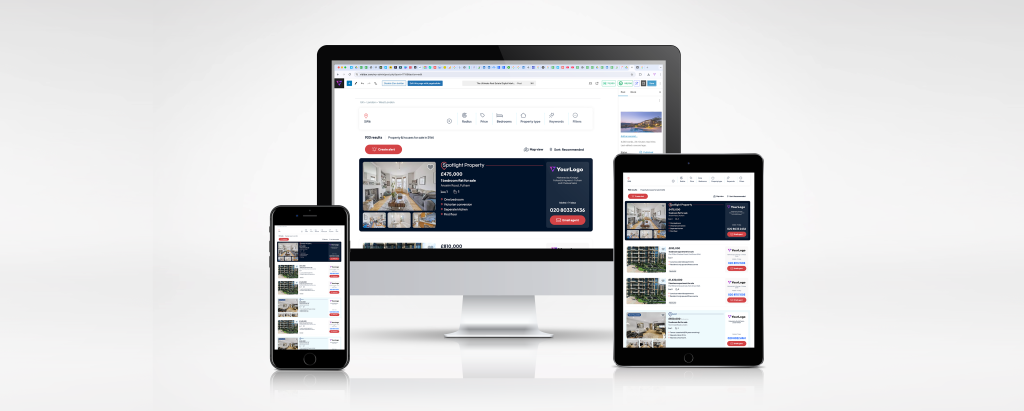
Your website is more than just an online brochure; it’s the central hub of your real estate digital marketing strategy and often the first impression a potential client will have of your brand. A high-performing real estate website needs to serve a variety of purposes simultaneously: educating prospective buyers and sellers, showcasing your listings in a visually compelling way, building trust, capturing leads, and performing well in search engine rankings.
To achieve this, the user experience must be seamless from start to finish. That means fast load speeds, mobile-first design, intuitive navigation, and IDX integration for real-time listing updates. These elements ensure your site is both user-friendly and optimised for Google’s search algorithm. Clear, strategic site architecture and internal linking help guide visitors toward key actions while supporting SEO performance.
But visibility and functionality alone aren’t enough — conversion is critical. Your site should be equipped with lead-capture tools like smart forms, live chat, gated content (e.g. market reports or buyer guides), and strong calls-to-action on every relevant page. Features like virtual tours, real estate video marketing, client testimonials, and neighbourhood guides enrich the user experience while positioning you as a credible and knowledgeable local expert.
Ultimately, your real estate website should act as your 24/7 digital sales assistant. It should inform, qualify, and convert visitors into leads while supporting every other piece of your real estate digital marketing strategy, from email campaigns to social media and paid advertising.
Real estate digital marketing – Why a Strong Foundation Matters:
- 80% of home buyers visit an agent’s website before making contact.
- 53% of users leave a site that takes more than 3 seconds to load.
- 61% of agents with optimised sites generate more inbound leads.
- Mobile-friendly websites see 2x more engagement than desktop-only designs.
- A clean, branded site improves trust and positions you as a professional authority.
Real estate digital marketing – Essentials for Success:
- Mobile-first design: 70%+ of users start on mobile.
- Fast load speed: Aim for <3 seconds.
- IDX integration: Display live MLS listings.
- Conversion optimisation: CTAs, lead forms, live chat.
4. Master SEO for Real Estate

Search Engine Optimisation (SEO) is essential for making sure your real estate brand is visible when potential clients search for homes or agents online. Search engines prioritise websites that show strong experience, expertise, authority, and trust. These principles, known as Google’s E-E-A-T guidelines, help ensure users are served content that’s accurate, helpful, and highly relevant. SEO includes optimising your website for keywords, improving technical performance, earning backlinks, and creating valuable content. A strong SEO foundation helps you rank for high-intent terms like “homes for sale in (your city)” or “top real estate agents near me.” Hyperlocal SEO also ensures you show up in maps, local directories, and voice search.
Also, pay attention to user intent (also called search intent). Understanding user intent is crucial because content that doesn’t match what people are looking for is unlikely to be seen, clicked on, or ranked well by search engines. Google’s algorithm prioritises content that aligns closely with what users want, whether it’s quick how-to advice, in-depth comparisons, or branded pages. For example, if someone searches “how to stage my home” and your page just talks about the benefits of real estate photography (without showing how to stage a home), they’ll bounce and Google will take note. In short, misaligned content = poor visibility, where content that matches user intent = high rankings, more engagement, better results.
Real estate digital marketing – Why SEO Matters:
- 75% of users never scroll past the first page of Google results.
- Local searches lead 78% of mobile users to visit a business within 24 hours.
- Real estate blogs generate 67% more leads than sites without content.
- Using schema markup increases click-through rates by 30%.
- Google prioritises fast, secure (HTTPS) and mobile-optimised sites in rankings
Real estate digital marketing – Key SEO Areas:
- Local SEO: Optimise Google Business Profile and directory listings.
- Content SEO: Blog about tips, neighbourhoods, and trends.
- Technical SEO: Use HTTPS, structured data, XML sitemaps.
5. Use Video in Real Estate Social Media Marketing
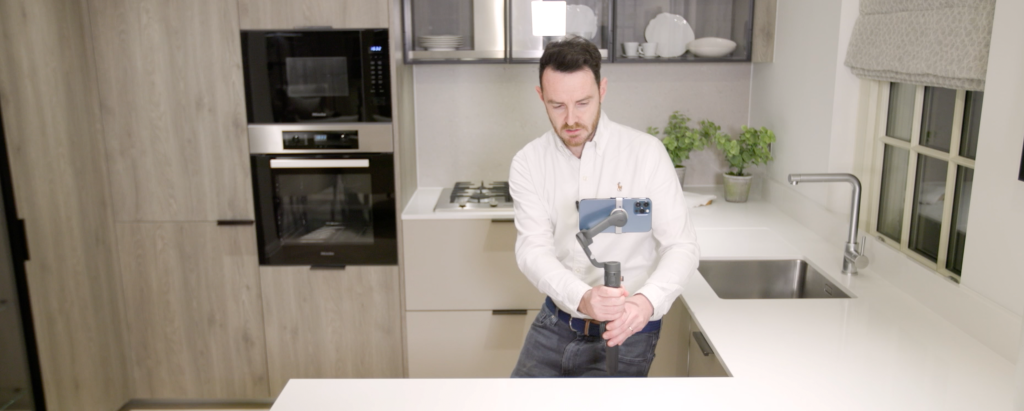
Video content has become the centrepiece of effective real estate social media marketing, and for good reason. It’s the most engaging, relatable, and versatile format for building trust, showcasing your personality, and creating compelling, immersive experiences for potential buyers and sellers. In an industry where connection, credibility, and first impressions matter, video helps you break through the noise and humanise your brand.
Whether it’s cinematic property tours, aerial drone footage, time-lapse renovations, or quick-hit reels featuring staging tips or market updates, video allows you to connect emotionally. It also lets you demonstrate your local expertise and establish a recognisable personal brand, which can significantly influence a client’s decision-making process.
In today’s multi-platform world, your video strategy should be omni-channel. YouTube remains the go-to for long-form content and SEO visibility, while Instagram Reels and TikTok offer high-reach opportunities with short-form, trend-driven content. Facebook and LinkedIn provide access to more mature audiences, ideal for higher-value listings or agent-focused branding. Embedding videos on your listings, blog posts, and landing pages further increases their impact and keeps users engaged longer on your site.
Importantly, video content boosts key performance metrics across the board, from social engagement and website dwell time to lead conversion and ad performance. If video isn’t already a key part of your real estate social media marketing strategy, it should be a top priority for staying competitive and relevant in 2025 and beyond.
Real estate digital marketing – Why Video Matters:
- 73% of sellers are more likely to list with agents who use video.
- Listings with video receive 403% more inquiries than those without.
- Social video generates 1200% more shares than text and image combined.
- TikTok and Instagram Reels algorithms heavily prioritise video.
- Videos boost average time-on-page by up to 88%, improving SEO.
Real estate digital marketing – Types of Real Estate Video Content:
- Listing walkthroughs and promos.
- Drone videos for luxury homes.
- Instagram Reels & TikToks.
- Agent Q&As, bios, tips and polls.
- Neighbourhood spotlights.
For inspiration on real estate social media marketing, check out our 15 Real Estate Social Media Content Ideas: Easy Marketing For 2025.
Real estate digital marketing – Top Video Tools:
- Vidibar, Invideo, Canva, Veed, Animoto, InShot.
- AI video tools like Descript, Synthesia, Pictory, or Runway.
- Host on YouTube, embed on your site, repurpose on social media.
6. Build a Real Estate Social Media Marketing Strategy

Social media is where relationships are built in 2025. Real estate social media marketing goes beyond posting listings. It’s about creating conversations, educating your audience, and building a brand people trust.
An effective real estate social media strategy weaves together multiple content types to engage audiences at different stages of the buyer or seller journey. This includes eye-catching listing promotions, neighbourhood highlights, behind-the-scenes content, testimonials, market insights, lifestyle inspiration, and short-form educational videos. Each piece should aim to either inform, entertain, or inspire action, while reinforcing your expertise and values.
Engagement is the new currency. Likes, comments, shares, and saves signal trust and relevance to both algorithms and your audience. It’s not just about reach; it’s about creating content that sparks conversation and encourages community interaction. Posting regularly, using a relatable tone, and tailoring content to the unique formats and audiences of platforms like Instagram, TikTok, Facebook, LinkedIn, and YouTube is key to growing your presence.
Ultimately, your real estate social media marketing strategy should reflect your brand voice, serve your audience’s needs, and position you as the go-to expert in your market. Done right, it not only builds awareness, but builds loyalty, drives leads, and fuels long-term business growth.
Real estate social media marketing – Why a Social Media Strategy Matters:
- 77% of realtors use social media for business — those who do well generate 2.5x more leads.
- Facebook still dominates for property-related searches, but TikTok is rising fast for discovery.
- Instagram posts with carousel formats get 70% more engagement.
- Personal branding through social boosts trust and recall.
- Social proof (reviews, DMs, comments) significantly influences buyer decisions.
Real estate social media marketing – Key Platforms:
- Instagram & TikTok: Visual listings, behind-the-scenes content, lifestyle and educational content.
- Facebook: Groups, events, and ads.
- LinkedIn: B2B, investor connections.
- YouTube: Evergreen search traffic.
Real estate social media marketing – Tips for Growth:
- Post 3–5 times weekly.
- Use local hashtags.
- Use Stories & polls.
- Go live for open houses
For more info on real estate social media marketing, check out our post – The 2025 Edge: Real Estate Social Media Marketing for Winning Agents.
7. Develop Email Marketing and Lead Nurturing Systems

Email remains a cornerstone of high-converting digital marketing for real estate agents. In an age of fast-scrolling social feeds and fleeting attention spans, email offers a direct, personal channel to engage your audience, whether they’re cold leads, warm prospects, or past clients.
When integrated with a robust CRM system, email marketing becomes even more effective. It allows agents to track user behaviour, segment audiences based on interest or stage in the buyer/seller journey, and deliver the right message at the right time. Whether it’s a homeowner weighing up whether to list or a buyer monitoring new properties in their price range, email keeps you connected long after someone visits your website or social profile.
Segmentation and automation are critical components of successful real estate email marketing. By tailoring content to different groups, such as first-time buyers, investors, or potential sellers, and setting up automated campaigns triggered by user actions, you can nurture leads in a way that feels timely and relevant.
Valuable content is the glue that holds it all together. Think beyond just new listings. Include monthly newsletters with market updates, neighbourhood spotlights, renovation tips, buyer and seller guides, open house invites, and personalised follow-ups. The goal is to build trust, provide ongoing value, and remain top-of-mind until the recipient is ready to take action.
Done right, email marketing doesn’t just generate leads, but builds long-term relationships, increases repeat business, and positions you as the go-to real estate expert in your market.
Real estate digital marketing – Why Email Marketing Matters:
- Email delivers an average ROI of $36 for every $1 spent.
- Personalised email campaigns increase click-through rates by 14%.
- Agents who use drip campaigns see up to 50% more conversions.
- Welcome emails generate 320% more revenue than promotional ones.
- Consistent newsletters help maintain engagement with past clients and future prospects.
Real estate digital marketing- Email Marketing Tactics:
- Use CRMs like HubSpot or Follow Up Boss.
- Run drip campaigns based on lead intent.
- Segment lists by buyer type.
- Share listings, tips, and local updates.
8. Run Paid Ads to Accelerate Growth
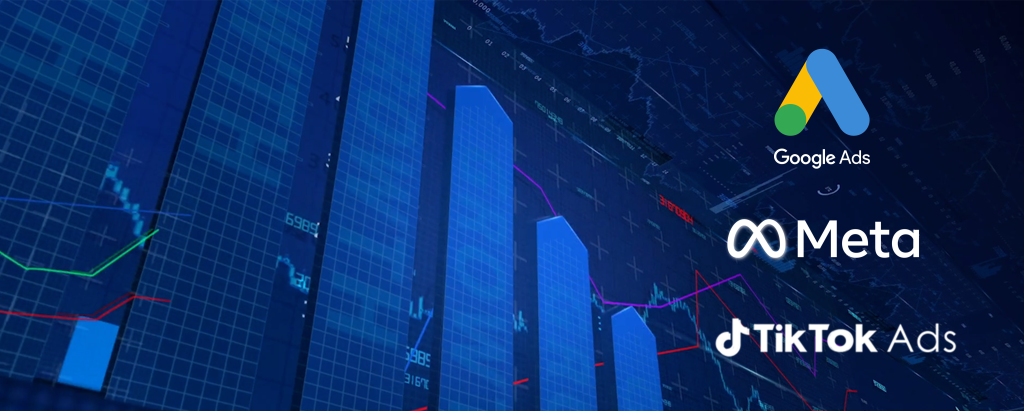
Organic marketing strategies in real estate are invaluable for building lasting relationships and trust, but they often require patience and consistent effort to gain momentum. In contrast, paid advertising offers the advantage of delivering faster, more measurable results by precisely targeting potential clients right when they’re most receptive.
Advertising platforms such as Google Ads, Facebook, Instagram, and YouTube provide sophisticated targeting options that allow you to zero in on your ideal audience based on factors like geographic location, online behaviour, demographics, and specific interests. This means you can promote everything from upcoming open houses and virtual tours to downloadable buyer guides or exclusive market reports directly to those most likely to engage.
In today’s highly competitive market, paid real estate ads are an essential component of a well-rounded real estate digital marketing strategy. They help increase visibility, drive qualified traffic, and accelerate lead generation, ensuring your message reaches both active buyers and sellers faster than organic methods alone.
Moreover, advanced real estate marketing tools like retargeting pixels enable you to reconnect with website visitors who didn’t convert initially, while lookalike audiences help you expand your reach by targeting new prospects who share characteristics with your best clients. Call tracking tools provide detailed analytics on which ads and campaigns are driving phone inquiries, allowing you to fine-tune your advertising budget and maximise ROI.
By combining strategic paid advertising with data-driven insights and continuous optimisation, you can scale your real estate digital marketing efforts effectively and stay ahead in an ever-evolving landscape.
Real estate ads – Why they Matter:
- Retargeted website visitors are 70% more likely to convert.
- Facebook ads can generate leads for under $5 depending on audience.
- Google Ads have a 50% higher conversion rate than organic.
- Video ads increase purchase intent by 97%.
- A/B testing ad creatives can double your ROI over time.
Real estate ads – Paid Ad Channels:
- Google Search: “Homes for sale in (City)”.
- Display ads: Retarget site visitors.
- Facebook & Instagram Lead Ads: Easy form fills.
- YouTube Pre-Roll & TikTok Ads: Video-based targeting.
Real estate digital marketing – Tips:
- Use high-res visuals.
- Geo-target precisely.
- Track results via pixels and tags.
9. Use AI and Automation for Smarter Real Estate Marketing
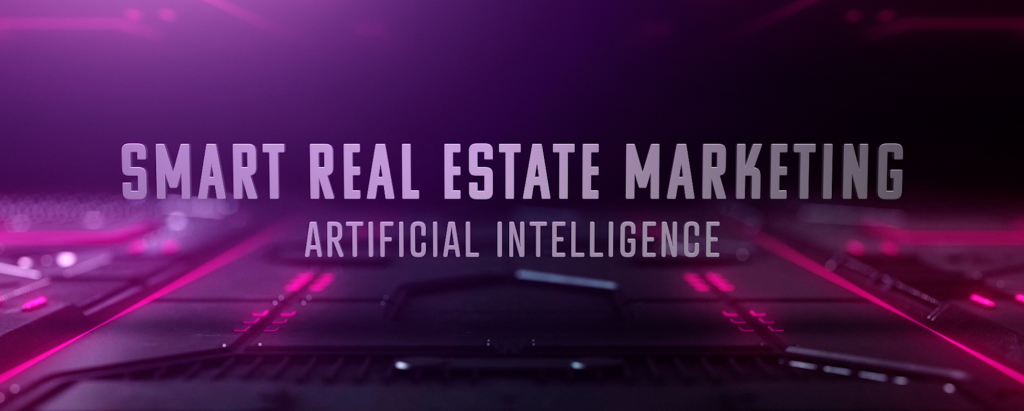
Marketing automation is a powerful tool for modern real estate agents, enabling you to scale your real estate digital marketing efforts efficiently while preserving time for what matters most — building genuine client relationships. Today’s advanced automation tools, powered by AI, can do much more than just schedule social media posts or send drip emails. They can assist in writing compelling blog content, qualifying leads through intelligent chatbots, editing real estate videos with minimal input, customising follow-up messages based on user behaviour, and even maintaining 24/7 communication with prospects through conversational AI. By automating repetitive tasks and streamlining workflows, agents can focus on higher-value activities like lead nurturing, closing deals, and delivering exceptional service.
When used strategically, automation doesn’t replace the human touch, it amplifies it. For instance, an automated welcome email can set expectations and provide value immediately after a lead fills out a form, while CRM automation can ensure no opportunity slips through the cracks by triggering reminders and personalised messages based on lead stage.
In a fast-moving industry like real estate, automation ensures your digital marketing engine keeps running smoothly, even when you’re out showing properties or negotiating deals. It provides consistency, speed, and scalability, helping agents stay top-of-mind and responsive in an increasingly competitive and digital-first landscape.
Real estate digital marketing – Why Automation Matters:
- AI-driven personalisation increases conversion rates by 25%.
- Chatbots improve lead capture by 33% on average.
- Automated social posting saves up to 6 hours/week.
- Predictive lead scoring improves follow-up efficiency by 29%.
- AI tools reduce manual effort in video and ad creation by 50%.
Real estate digital marketing – Automation Ideas:
- Chatbots for lead capture (Tidio, Drift).
- AI video scriptwriting (ChatGPT, Jasper)
- Predictive analytics tools (Lofty AI, Zillow Premier Agent)
- Social scheduling (Buffer, Metricool)
- Video editing (Veed, Invideo, Synthesia)
10. Blend Offline and Online Marketing
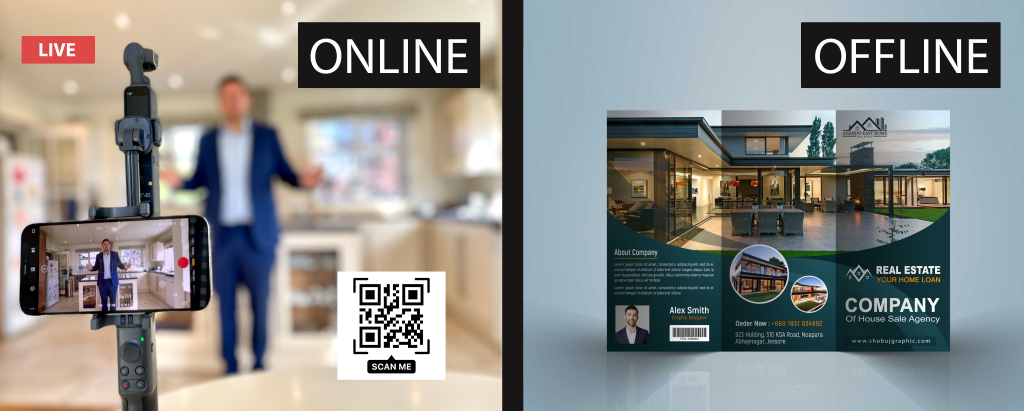
The most effective real estate marketing campaigns integrate online and offline channels. Signs, brochures, postcards, and events still work, but only when connected with digital calls-to-action. QR codes, live-streamed open houses, and downloadable guides are just a few ways to bridge the gap. When your offline branding matches your online experience, trust and recognition increase dramatically.
For example, QR codes on flyers or signage can direct prospects to virtual tours, lead capture forms, or downloadable neighbourhood guides, blending convenience with interactivity. Hosting a live-streamed open house alongside an in-person one expands your reach beyond foot traffic and captures leads from interested remote viewers. Even classic real estate marketing materials like postcards or business cards can become digital gateways when linked to personalised landing pages, property videos, or chat-enabled websites.
Consistency is key: your offline branding (logos, colours, messaging) should align with your digital presence to build brand recognition and trust. When a potential client sees the same visual identity and tone across a Facebook ad, a property brochure, and your website, it reinforces credibility and professionalism.
By connecting offline efforts with online calls-to-action and analytics, you not only broaden your audience but also gain valuable data to refine your marketing. This kind of omni-channel approach is what sets apart high-performing real estate digital marketing in 2025. It helps agents stay visible at every stage of the buyer and seller journey, creating more touch-points and driving stronger results.
Real estate digital marketing – Why Connected Marketing Matters:
- Homes marketed with both online and offline tactics sell 20% faster.
- QR code usage has grown 96% year-over-year.
- Print ads that include links or digital follow-ups see 43% more response.
- In-person events promoted online see 2–3x higher attendance.
- Consistency across channels increases brand recall by 68%.
Real estate digital marketing – Integration Ideas:
- Use QR codes on signs linking to virtual tours.
- Promote open houses via Facebook Events.
- Offer downloadable guides for email signups.
11. Track KPIs and Analytics
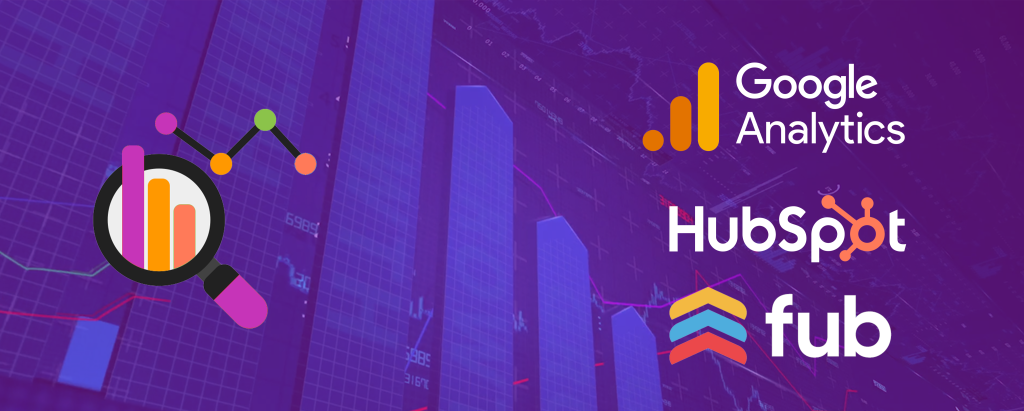
Without tracking, it’s hard to no what’s working and what’s not. Clear Key Performance Indicators (KPIs) are essential to understanding what real estate marketing tools are delivering results, what needs refinement, and where your marketing budget is best spent. Whether you’re aiming to generate more leads, increase property inquiries, or boost brand awareness, measurable goals backed by data help ensure every tactic contributes to real business outcomes.
For real estate agents, key metrics might include website traffic, average time on page, bounce rates, cost-per-click (CPC), email open and click-through rates, social media engagement, and, most critically, lead-to-client conversion rates. Tracking these KPIs allows you to pinpoint which real estate marketing tools are driving results and which campaigns may be underperforming.
Modern tools make performance tracking accessible and actionable. Google Analytics 4 (GA4) offers deep insights into user behaviour, demographics, and traffic sources. Real estate CRM platforms such as Follow Up Boss, kvCORE, or HubSpot let you trace the customer journey from first interaction to closed deal. Meta dashboards and ad platforms like Google Ads provide real-time metrics for optimising paid campaigns. Email marketing platforms like Mailchimp, ActiveCampaign, or Constant Contact reveal how subscribers engage with your content.
The key is not just collecting data, but using it to improve. By regularly analysing and adjusting your digital marketing strategy based on performance, you ensure you’re focusing time and budget on the most effective channels. In today’s competitive environment, data-driven real estate digital marketing is the standard for agents who want to scale smart and win consistently.
Real estate digital marketing – Why KPI’s Matter:
- Data-driven campaigns are 63% more successful.
- Measuring ROI leads to a 21% increase in budget efficiency.
- Top-performing agents track 5–10 core KPIs regularly.
- Real-time insights reduce lead response times by up to 80%.
- Visual dashboards make performance easy to share with your team.
Real estate digital marketing – Key KPI Metrics:
- Website traffic & bounce rate.
- Lead conversion rate.
- Email open/click rate.
- Video engagement.
- Social growth.
- CPL & ROI.
Real estate digital marketing – KPI Tools to Use:
- Google Analytics 4.
- Meta Business Suite.
- CRM dashboards.
12. Use the Right Real Estate Marketing Tools

Your tech stack is more than a set of tools. The right real estate marketing tools streamline operations, enhance client experiences, and unlock significant time savings, allowing agents to focus on what they do best: building relationships and closing deals. In a fast-paced market where buyers and sellers expect instant communication, personalised content, and seamless digital experiences, having the right technology in place is non-negotiable.
A modern real estate tech stack typically includes a Customer Relationship Management (CRM) system to manage leads and automate follow-ups. IDX-integrated websites not only showcase listings beautifully but also help with SEO and lead capture. Tools like Vidibar, Canva or Invideo simplify content creation. AI-powered writing assistants (such as ChatGPT or Jasper) help you generate listing descriptions, email templates, blog posts, and social media captions at scale.
Beyond content, tools for email marketing (like Mailchimp or ActiveCampaign), analytics (such as Google Analytics 4 or Meta Business Suite), and automation platforms (like Zapier or Real Geeks) tie everything together, ensuring your real estate digital marketing efforts are efficient and data-driven. You can also integrate scheduling apps, chatbot services, reputation management tools, and even virtual staging software to further elevate your brand.
Choosing the right tools depends on your business goals, budget, and workflow, but investing in a cohesive, well-integrated tech stack turns your real estate digital marketing into a well-oiled machine. In today’s landscape, scalable and effective real estate digital marketing starts with smart technology.
Real estate digital marketing – Why Tech Stack Matters:
- 82% of top agents use automation tools daily.
- Integrated CRMs improve close rates by 30%.
- Video and design tools reduce production time by 50%.
- Social scheduling platforms increase consistency, which drives 3x more engagement.
- The right tools let you focus more on clients and less on admin.
Real Estate Digital Marketing – Top Tools in 2025:
| Website / IDX | Placester, AgentFire |
| CRM | Reapit, Dezrez, Alto, Follow Up Boss, HubSpot, LionDesk |
| Mailchimp, ActiveCampaign, Brevo, MailerLite | |
| SEO | Semrush, Ahrefs, Rank Math |
| Video | Vidibar, Invideo, Canva, Animoto, InShot |
| Social Scheduling | Metricool, Buffer, Later |
| AI Tools | ChatGPT, Jasper, Pictory |
Real Estate Digital Marketing – Final Take-Aways
In 2025, real estate success depends not just on market knowledge, but on a powerful, strategic digital presence. Whether you’re an independent agent, a broker leading a team, or part of a larger agency, mastering real estate digital marketing is key to growth. Today’s buyers and sellers are digitally native, mobile-first, and expect seamless, personalised experiences at every touchpoint. That means your marketing needs to be as dynamic and data-driven as the people you’re trying to reach.
From SEO and real estate social media marketing to video content, paid advertising, automation, and AI-powered tools, the most effective strategies focus on meeting your audience where they are, while delivering consistent value, building credibility, and accelerating conversions. Your ability to engage across platforms like Google, Instagram, YouTube, TikTok, and email directly influences how visible, trusted, and competitive your brand becomes.
But tools alone aren’t enough; the key is integration. Creating a unified, omni-channel strategy where each piece of content, campaign, and platform works together to serve your business goals. When your branding, messaging, and lead nurturing are aligned across digital touch-points, you not only boost efficiency but also drive long-term growth.
By embracing the full spectrum of real estate marketing tools and weaving them into a cohesive strategy, you don’t just stay relevant, you rise above the noise. In today’s fast-evolving market, those who invest in smart, strategic digital marketing will be the ones who win more listings, close more deals, and lead the way in 2025 and beyond.






